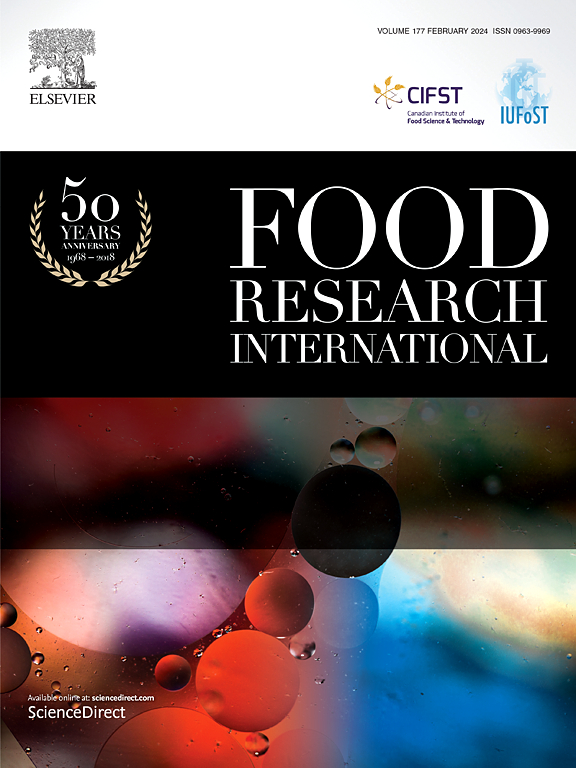ph活化液体微滴载体增强藻蓝蛋白口服递送和持续的生物活性后消化
IF 8
1区 农林科学
Q1 FOOD SCIENCE & TECHNOLOGY
引用次数: 0
摘要
尽管c -藻蓝蛋白(C-phycocyanin, PC)具有多种治疗功能,但在涉及消化酶和pH变化的胃肠道(GI)条件下,它是高度不稳定的,导致其快速降解,随后在吸收前失去生物活性。因此,保护性口服给药系统对于提高其生物利用度和给药效率至关重要。本研究以鱼明胶(FG)和岩藻糖聚糖(FC)为载体,构建了一种水不混溶、ph响应的微滴系统,以保护和输送PC到小肠。在pH为3.3、混合质量比为80:20的条件下,FG与FC稳定的复合凝聚形成了液态微滴,而B型牛明胶(GB)与FC的结合产生了固体沉淀。在此优化条件下,PC包封成功,包封效率高达98%。在连续模拟消化过程中,COA表现出pH触发的解离和酶降解,使PC持续保留在胃液中,并在肠道环境中选择性释放(pH 7)。重要的是,与未受保护的PC相比,COA释放的PC在模拟消化过程中保持了其结构稳定性,并表现出优越的生物活性,这一点得到了巨噬细胞一氧化氮生成和2,2-二苯基-1-picrylhydrazyl (DPPH)自由基清除实验的证实。综上所述,本研究建立了海洋源性凝聚体作为ph激活的可持续载体,确保保护脆弱的生物活性蛋白和靶向肠道递送。本文章由计算机程序翻译,如有差异,请以英文原文为准。

pH-activated liquid microdroplet carrier for enhanced phycocyanin oral delivery and sustained bioactivity post-digestion
Although C-phycocyanin (PC) possesses various therapeutic functions, it is highly unstable under gastrointestinal (GI) conditions involving digestive enzymes and pH variations, leading to rapid degradation and subsequent loss of bioactivity before absorption. A protective oral delivery system is therefore essential to enhance its bioavailability and delivery efficiency. In this study, a water-immiscible, pH-responsive microdroplet system was developed using fish gelatin (FG) and fucoidan (FC) as carriers to protect and deliver PC to the small intestine. Stable complex coacervation between FG and FC at pH 3.3 and a mixing weight ratio of 80:20 formed liquid microdroplets, whereas the combination of bovine gelatin type B (GB) and FC yielded solid precipitates. Under these optimized conditions, PC was successfully encapsulated with high efficiencies (> 98 %). During sequential simulated digestion, COA exhibited pH-triggered dissociation and enzymatic degradation, enabling sustained PC retention in gastric fluid and selective release in the intestinal environment (pH 7).Importantly, PC released from COA preserved its structural stability during simulated digestion and demonstrated superior bioactivities, confirmed by nitric oxide generation in macrophages and 2,2-diphenyl-1-picrylhydrazyl (DPPH) radical-scavenging assays, compared to unprotected PC. Taken together, this study establishes marine-derived coacervates as pH-activated, sustainable carriers that ensure protection of delicate bioactive proteins and targeted intestinal delivery.
求助全文
通过发布文献求助,成功后即可免费获取论文全文。
去求助
来源期刊

Food Research International
工程技术-食品科技
CiteScore
12.50
自引率
7.40%
发文量
1183
审稿时长
79 days
期刊介绍:
Food Research International serves as a rapid dissemination platform for significant and impactful research in food science, technology, engineering, and nutrition. The journal focuses on publishing novel, high-quality, and high-impact review papers, original research papers, and letters to the editors across various disciplines in the science and technology of food. Additionally, it follows a policy of publishing special issues on topical and emergent subjects in food research or related areas. Selected, peer-reviewed papers from scientific meetings, workshops, and conferences on the science, technology, and engineering of foods are also featured in special issues.
 求助内容:
求助内容: 应助结果提醒方式:
应助结果提醒方式:


